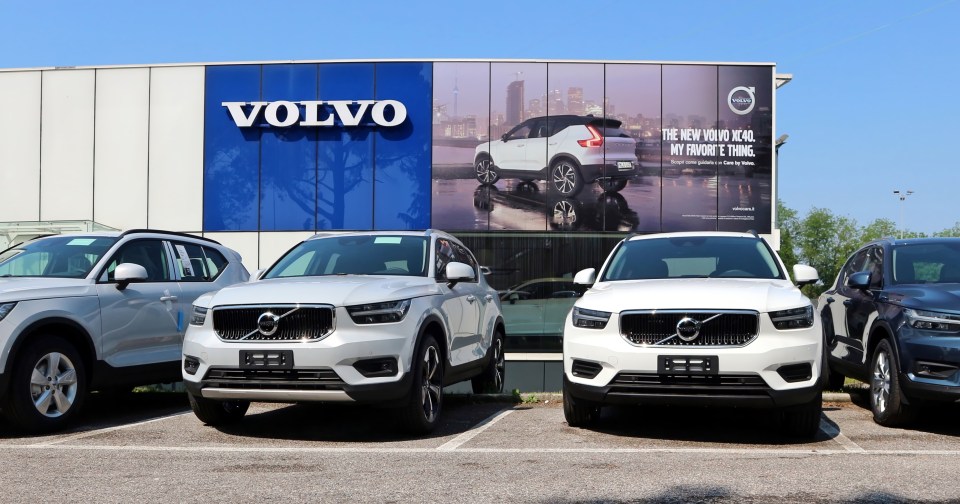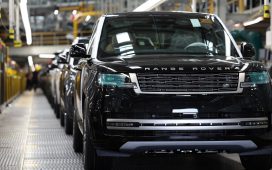A MAJOR car brand is facing a “challenging period,” with a huge restructuring plan set to axe 3,000 jobs in a bid to cut costs.
The popular car manufacturer blamed rising costs, slowing demand for electric vehicles, and uncertainty over trade tariffs for its decision to cut jobs.
Volvo revealed that most of the job cuts will affect office-based staff in Sweden, which is around 15 per cent of its global office workforce.
The cuts will affect about 1,200 employees and 1,000 consultants, the automaker said.
CEO Håkan Samuelsson said the cuts would help improve the automaker’s cash flow and reduce overall costs.
He added: “It’s white collar in almost all areas, including R&D, communication, human resources.
“So it’s everywhere, and it’s a considerable reduction.”
Fredrik Hansson, Volvo’s new CFO, said that despite thousands of job cuts, the move would make the company “structurally more efficient.”
Volvo’s restructuring will cost an eye-watering £103million, which will impact its second-quarter results.
The popular car brand is introducing these sweeping cuts following reports of a 60 per cent dip in their first-quarter operating income.
Falling sales and revenues add pressure
The announcement follows a turbulent few months for Volvo, based in Gothenburg, Sweden.
Global deliveries slumped by 6 per cent in the first quarter of 2025 compared to last year, causing revenue to drop by 11.7 per cent, from £7.3bn to £6.4bn, according to Autocar.
The automaker is facing what it describes as “challenges not seen before” in the automotive sector, with rising costs, supply chain disruptions, and cooling demand weighing heavily on performance.
Former CEO Håkan Samuelsson, recently reinstated after Jim Rowan’s exit, is leading the shake-up.
Samuelsson warned: “The automotive industry is in the middle of a very difficult period with challenges not seen before.
“We must get better at delivering results.”
Investment cuts and uncertain forecasts
Volvo also revealed it is scaling back investments further, following a big drop in earnings before interest and tax, plunging from £370m to £120m year-on-year.
The company will stop providing financial forecasts for 2025 and 2026, saying market conditions remain too uncertain.
The cost-saving strategy includes a shift toward regionalised operations.
Volvo recently launched an updated S90 saloon exclusively for China and started building the EX30 electric crossover at its Ghent plant in Belgium, previously made only in China.
It also plans to sharpen its model range in the US and optimise production at its Spartanburg facility in South Carolina.
Samuelsson added: “While our strategy is clear, we must adapt quickly to survive.
“Our focus now is profitability, electrification and regionalisation.
Volvo’s announcement follows a growing trend of major job cuts across the global automotive industry as companies brace for a tough market environment.
Audi also revealed plans to axe 7,500 jobs as part of a huge cost-saving drive.
The Volkswagen-owned manufacturer announced the cuts would be carried out at its German sites by 2029, aiming to save around €1 billion (£842.5 million) annually in the medium term.
The job cuts at Audi represent about 8.6 per cent of the brand’s global workforce.
Audi said in a statement: “The economic conditions are becoming increasingly tougher, competitive pressure and political uncertainties are presenting the company with immense challenges.”
The carmaker, headquartered in Ingolstadt, said the reductions would mostly affect areas such as administration and development.
Audi stressed that the cuts would be implemented in a “socially responsible” manner, avoiding compulsory redundancies.
Instead, roles will be reduced through natural attrition — meaning workers will not be replaced when they retire or leave the company.
Despite the cuts, Audi is investing heavily in its German operations, pledging €8 billion (£6.7 billion) over the next four years.
Part of the investment will go towards producing a new entry-level electric model at its Ingolstadt plant, with further developments considered for its second German site in Neckarsulm.
Audi’s chairman Gernot Döllner said: “We are setting Ingolstadt and Neckarsulm up to be robust and flexible for the challenging transition to electric mobility.
Audi must become faster, more agile, and more efficient. One thing is clear: this cannot be done without personnel adjustments.
Meanwhile, Audi’s parent company Volkswagen announced back in December that it would cut 35,000 jobs at its VW brand sites across Germany by 2030.
The job reductions are part of the ‘Future Volkswagen’ agreement, hammered out with union representatives to help slash labour costs by €1.5 billion (£1.25 billion) per year.
Volkswagen emphasised that the job cuts would not involve any plant closures and would also be implemented “socially responsibly”.
Volkswagen’s plan also includes a significant capacity reduction, aiming to lower production volumes by around 734,000 units across its German manufacturing network.












